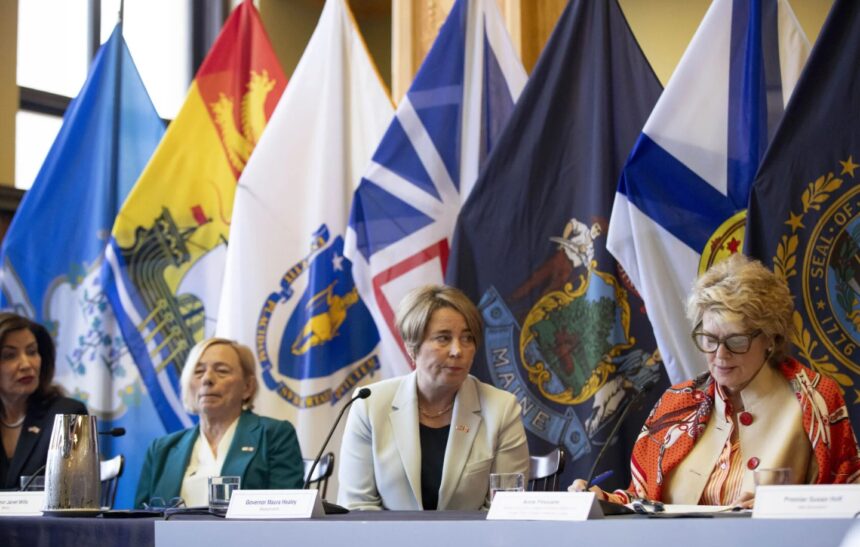After a day of tense discussions at the Northeastern Governors and Eastern Canadian Premiers conference in Manchester, New Hampshire, I witnessed something increasingly rare in our fractured diplomatic landscape: pragmatic cooperation despite national-level economic friction.
“The aluminum tariffs are deeply concerning, but our cross-border supply chains are too valuable to abandon,” Quebec Premier François Legault told me during a brief hallway conversation after the main session ended. His province exports approximately $7 billion in aluminum to the United States annually, making the recently imposed 10% tariff particularly painful for Quebec’s economy.
The conference, coming just weeks after President Biden reinstated Trump-era tariffs on Canadian aluminum and steel, showcased the complex reality of regional trade relationships that often operate beneath the headline-grabbing national disputes. Representatives from Maine, Vermont, New Hampshire, Massachusetts, Connecticut, Rhode Island, Quebec, New Brunswick, Nova Scotia, Prince Edward Island, and Newfoundland and Labrador gathered to reaffirm their economic interdependence.
New Hampshire Governor Chris Sununu, hosting the event, struck a conciliatory tone that contrasted sharply with the White House’s recent protectionist measures. “Our regional economy doesn’t recognize international boundaries the way Washington does,” Sununu said during his opening remarks. “When a business in New Hampshire partners with suppliers in Quebec, that’s not foreign trade – that’s just Tuesday.”
The numbers support this perspective. According to data from the U.S. Department of Commerce, the New England states conduct over $13.8 billion in annual trade with Eastern Canadian provinces. Maine alone sends nearly 40% of its exports to Canada, supporting approximately 38,300 jobs according to the Canadian government.
I’ve covered trade disputes across three continents, and what struck me most was the disconnect between national rhetoric and regional reality. While President Biden frames the aluminum tariffs as necessary protection for American workers, governors and premiers described them as counterproductive disruptions to deeply integrated supply chains that benefit both sides of the border.
“These tariffs solve a problem that doesn’t exist in our region,” Maine Governor Janet Mills explained during the economic development roundtable. “Our manufacturing sectors are partners, not competitors. When Canadian component makers suffer, Maine’s finished goods producers suffer too.”
The conference yielded several concrete initiatives designed to strengthen regional economic ties despite federal headwinds. These included a new cross-border small business development program, shared investment in clean energy transmission infrastructure, and streamlined border crossing procedures for commercial vehicles.
Vermont Commerce Secretary Lindsay Kurrle highlighted the practicality of these efforts: “We’re focusing on what we can control at the state level while the national governments work through their differences. The dairy farmer in Vermont selling milk to processors in Quebec can’t wait for perfect trade conditions.”
What makes this regional diplomacy particularly significant is the stark contrast with increasingly hostile rhetoric at the national level. Just days before the conference, U.S. Trade Representative Katherine Tai defended the aluminum tariffs as necessary to combat what she called “unfair Canadian trade practices,” while Canadian Deputy Prime Minister Chrystia Freeland had countered by calling the measures “unjustified and unlawful.”
Yet in Manchester, the tone was markedly different. Governor Maura Healey of Massachusetts emphasized how the region’s integrated clean energy economy depends on Canadian hydropower and U.S. wind technology – sectors now threatened by rising trade barriers.
“We’re racing against climate change while the national governments are fighting over aluminum,” Healey said during the afternoon energy panel. “Massachusetts has committed to net-zero emissions by 2050, and that goal requires Canadian hydroelectricity flowing south across the border.”
The Eastern Canadian premiers expressed frustration but maintained a focus on practical solutions. Nova Scotia Premier Tim Houston noted that his province exports approximately $1.3 billion in goods to New England annually, with seafood, timber products, and energy leading the way.
“We’ve weathered trade disputes before,” Houston told me after his presentation. “The relationship between Nova Scotia and New England is older than either of our national governments. These tariffs are a storm we’ll navigate together.”
The conference also highlighted an often-overlooked dimension of cross-border trade: labor mobility. With both regions facing worker shortages, particularly in healthcare and skilled trades, governors and premiers discussed improved credential recognition and streamlined work permitting.
According to the Conference Board of Canada, approximately 400,000 people cross the U.S.-Canada border daily for business, tourism, or family visits. Many of these crossings represent essential economic activity in border communities where national divisions feel artificial.
“When I need electricians for a major project, I don’t care which side of the border they live on,” said Marie LeBlanc, a construction contractor from northern Maine who attended the conference’s business forum. “But these tariffs ripple through everything – suddenly my Canadian subcontractors have higher costs, which get passed to me and then to my clients.”
The broader context for this regional cooperation is a global trade environment increasingly defined by protectionism. Since 2018, the World Trade Organization has documented a steady rise in trade-restrictive measures among G20 economies, with the U.S. and Canada caught in this wider trend despite their historically integrated economies.
As the conference concluded, participants issued a joint declaration committing to “preserve and enhance cross-border economic cooperation despite national-level trade tensions.” While lacking the power to override federal tariff policies, this regional commitment represents a significant counter-current to the protectionist tide.
For residents of these border regions, the practical outcomes of the conference may provide some reassurance that their economic interests won’t be completely sacrificed to national politics. As Premier Legault summarized before departing: “Geography and history have made us partners. Politics cannot easily undo that.”






